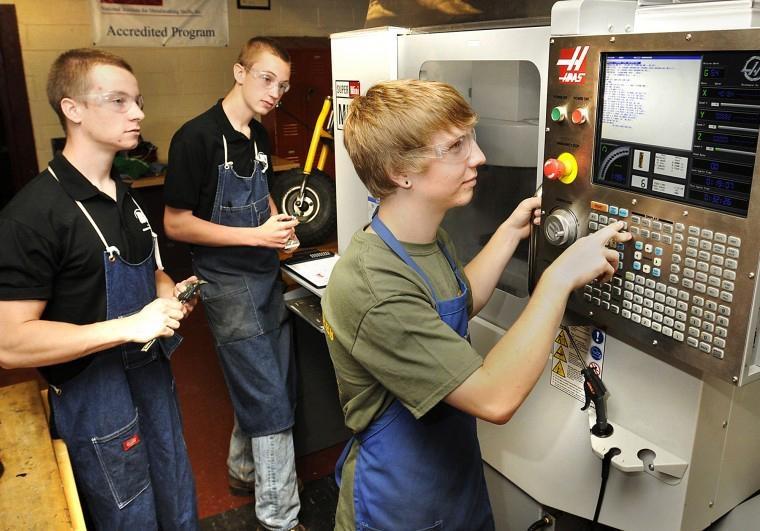Training and Retraining Workforce at Heart of Bucks Tech School $23 Million Renovation
With its two-year, $23 million renovation and expansion project nearly complete, the Upper Bucks County Technical School is poised to assume a more prominent role in training and retraining workers for 21st-century jobs in the region.
By joining forces with Bucks County Community College and the Bucks County Workforce Development Board, the school hopes to narrow what some employers say is a growing gap between their needs and the skill sets of available workers.
 That was the message delivered by UBTech executive director Bern Wagenseller and others at the Upper Bucks Chamber of Commerce’s annual meeting in Quakertown. Lauren Loeffler of the community college and Liz Walsh, executive director of the workforce development board, joined Wagenseller in outlining what they are doing to produce the kinds of workers sought by businesses.
That was the message delivered by UBTech executive director Bern Wagenseller and others at the Upper Bucks Chamber of Commerce’s annual meeting in Quakertown. Lauren Loeffler of the community college and Liz Walsh, executive director of the workforce development board, joined Wagenseller in outlining what they are doing to produce the kinds of workers sought by businesses.
“We need to meet the needs of industry,” Wagenseller said. “It doesn’t do any good to train students if their skills aren’t going to useful to an employer.”
The revamped tech school in Bedminster should help. With space for new programs, high-tech equipment and creative work-experience programs, the school will produce more students prepared to enter the workforce immediately or go on to post-secondary schools, Wagenseller said.
To help overcome the perception that tech school is not a stepping stone to college, Wagenseller said he is “stoked” about a recently formed alliance that includes the county’s three technical schools, community college and county workforce development board.
The alliance is developing a program that would allow students to earn college credits while attending tech school. It hopes to land a $1.3 million state grant to implement the program over the next four years.
The college courses would allow tech students to learn the skills to run a business down the road, skills such as accounting, human resources and marketing, which they barely touch on now, he said.
“We’re training welders and nurses and police officers,” Wagenseller said. “But in five or ten years, they’ll be looking to move into management positions or own their own businesses.”
Meanwhile, UBTech has added a career internship program that allows students to earn while they learn, get high school credit for work experience and build a resume that will be helpful regardless of their career path, he said.
The renovation also has allowed the school to bring gender equity to its programs. In some shops, for example, there was only one changing area, which meant female students had to wait or get changed in a custodial closet, Wagenseller said.
“It sent the wrong message that some students were not welcomed,” he said. “We’re trying to attract more females into nontraditional careers, yet we’re telling them they’re not wanted.”
As a result, UBTech has become one of the first tech schools in the state to offer individual changing booths for students, similar to what you find in a department store, Wagenseller said.
To keep its curriculum current, twice a year the tech school invites an advisory board of about 150 businesses – representing the school’s 21 career paths – to visit the shops, sit in on classes, observe what is being taught and offer suggestions for improvements, Wagenseller said.
“It’s important that we are teaching the right things,” he said.
And now that the renovations are nearing completion, the tech school is getting ready to reinstitute its adult education program and focus more on classes that offer workers a chance to improve their skills.
Loeffler, executive director of workforce development for BCCC, said her department provides customized training in several disciplines, including leadership and supervision, sales, customer service, conflict resolution and business writing and math. Training can be held at a company or college facility, she said.
The college also provides safety training in areas such as hazardous materials, working in confined spaces and electrical safety. In fact, Loeffler said she would like to see more businesses take advantage of the services her department offers.
Looking at the audience, she said most people probably don’t know her.
“We’ve always looked at ourselves as the best-kept secret on campus,” she said.
The county also is on the cusp of launching a program that allows workers to post their skills and interests – and employers to post their needs. The program would match the two for an internship, Loeffler said.
She echoed Wagenseller in emphasizing that employers must let educators know what skills are needed now and into the future.
BCCC is planning a “robust” employer survey to gather such information in the spring, she said.
“We need to find out what the needs are so we can get people back in the workforce,” she said. “There is a huge gap.”
The article written by Joe Ferry, was originally published by Lehigh Valley Business Journal.

